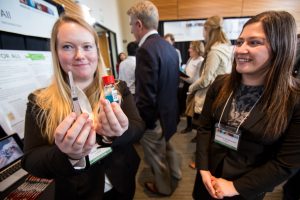New Health Innovation Challenge launches

Emily Willard (left) and Katherine Brandenstein (right) of team Engage display the prototype for the SafeShot, a device to sterilize needles and prevent the spread of bloodborne pathogens.
Eighteen teams of excited students clustered together in the University of Washington’s Dempsey Hall. The students put up posters and perfectly curated prototype displays as the start time of the inaugural Health Innovation Challenge on March 3, 2016 approached. They were joined by nearly 120 health professionals, CEOs and technology experts, who were on hand as judges at the HIC.
Dean Jim Jiambalvo, welcoming the group to the event, talked briefly about the future of healthcare. “We’re all worried about the high cost of treatment — healthcare is over 17% of GDP. We know that many people have incomplete coverage, there’s a shortage of primary care professionals, and we have an aging population. But the hope for the future comes from video consultations with healthcare providers, wearable devices that monitor our health, robotic surgical devices, using Twitter to track flu outbreaks, and advances in secure electronic health records. We’re here because we all have a common desire to change health and healthcare for the better. And I take personal pleasure in seeing the creativity and ingenuity of our students.”
The creativity and ingenuity was in full display. Some students wore lab coats, others looked ready to head to the gym in sleek athletic apparel. They represented the wide gamut of the health innovation industry – some students tackled access to fitness, others are getting ready to pitch their allergy alert systems and new biocompatible materials for 3D printing tissue.
The Challenge gave students the opportunity for feedback through one-on-one interactions with judges during the tradeshow-style product demonstration phase, as well as a chance to address the entire crowd with on-stage 60-second pitches.
Engage, a Washington State University team, won the $10K Hollomon Family grand prize for their idea to prevent the spread of bloodborne pathogens as a result of contaminated injections. The $5K Herbert B. Jones Foundation second place prize went to UW’s miPS, which preserves and stores iPS cells for stem cell regeneration, and the $2.5K CoMotion third place prize to UW’s MultiModal Health, which uses an engaging software program to measure physical rehabilitation progress.
The crowd was abuzz with the electricity of new ideas and hope for the future of health and healthcare. It’s clear that this is only the beginning of what will be a long-running innovation competition, and Seattle’s health industry professionals could not be more ready.
